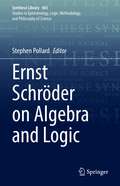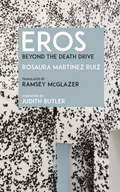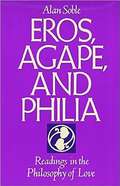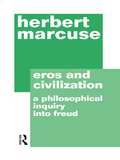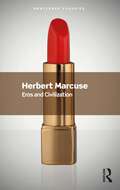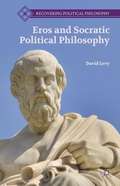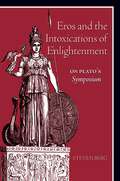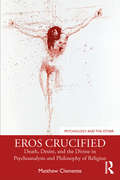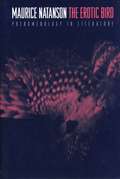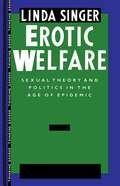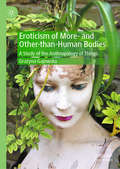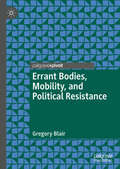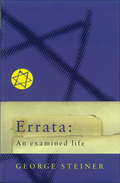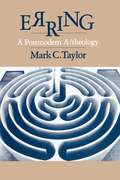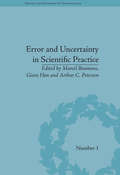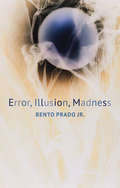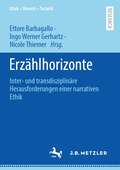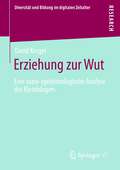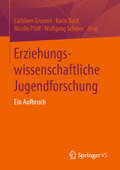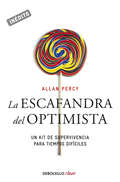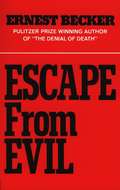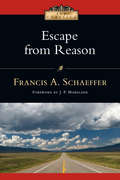- Table View
- List View
Ernst Schröder on Algebra and Logic (Synthese Library #465)
by Stephen PollardThis volume offers English translations of three early works by Ernst Schröder (1841-1902), a mathematician and logician whose philosophical ruminations and pathbreaking contributions to algebraic logic attracted the admiration and ire of figures such as Dedekind, Frege, Husserl, and C. S. Peirce. Today he still engages the sympathetic interest of logicians and philosophers. The works translated record Schröder’s journey out of algebra into algebraic logic and document his transformation of George Boole’s opaque and unwieldy logical calculus into what we now recognize as Boolean algebra. Readers interested in algebraic logic and abstract algebra can look forward to a tour of the early history of those fields with a guide who was exceptionally thorough, unfailingly honest, and deeply reflective.
Eros: Beyond the Death Drive
by Rosaura Martínez RuizEros considers a promise left unfulfilled in Sigmund Freud’s Beyond the Pleasure Principle. Rosaura Martínez Ruiz argues that when the pleasure principle comes into contact with the death drive (the human tendency toward aggression or cruelty), the psyche can take detours that, without going beyond the limit of the pleasure principle, can nevertheless defer it. Eros reflects on these deviations of the pleasure principle, in the political sphere and in the intimate realm. Following these erotic paths, Martínez argues that the forces of the death drive can only be resisted if resistance is understood as an ongoing process. In such an effort, erotic action and the construction of pathways for sublimation are never-ending ethical and political tasks. We know that these tasks cannot be finally accomplished, yet they remain imperative and undeniably urgent.If psychoanalysis and deconstruction teach us that the death drive is insurmountable, through aesthetic creation and political action we can nevertheless delay, defer, and postpone it. Calling for the formation and maintenance of a “community of mourning duelists,” this book seeks to imagine and affirm the kind of “erotic battalion” that might yet be mobilized against injustice. This battalion’s mourning, Martínez argues, must be ongoing, open-ended, combative, and tenaciously committed to the complexity of ethical and political life.
Eros, Agape and Philia: Readings in the Philosophy of Love
by Alan SobleThe philosophy of love for centuries, popular writers and respected scholars have written about and analyzed the phenomenon of love without exhausting its potential for contemporary debate. By representing the three major traditions in the philosophy of love--Platonic eros, Christian agape, and Aristotelian philia--editor Alan Soble has not only examined the intellectual problem of what "love" is, but has designed a dialogue among the three traditions in genuine philosophical style. "Eros is acquisitive, egocentric or even selfish; agape is a giving love. Eros is an unconstant, unfaithful love, while agape is unwavering and continues to give despite ingratitude. Eros is a love that responds to the merit or value of its object; while agape creates value in its object as a result of loving it. . . Finally, eros is an ascending love, the human's route to God; agape is a descending love, GodÆs route to humans. . . Philia is caught between eros and agape. "--From the Introduction to Eros, Agape and Philia ISSUES EXPLORED: --What is the state of love today as seen through the eyes of Plato, Aristotle, and Paul? --How do relations between the sexes illustrate the difficulties of love? --What are the nature and effects of exclusivity, reciprocity, and constancy? --What are the conceptual and psychological ties between sex and love? --Does it make any sense to think of love in moral terms?
Eros and Civilization: A Philosophical Inquiry into Freud
by Herbert MarcuseIn this classic work, Herbert Marcuse takes as his starting point Freud's statement that civilization is based on the permanent subjugation of the human instincts, his reconstruction of the prehistory of mankind - to an interpretation of the basic trends of western civilization, stressing the philosophical and sociological implications.
Eros and Civilization: A Philosophical Inquiry Into Freud (Routledge Classics)
by Herbert MarcuseHailed as the 'Guru of the New Left' and a leading figure of 1960s counterculture and liberation movements, the philosopher Herbert Marcuse is amongst the most renowned and controversial thinkers of the twentieth century. Eros and Civilization is one of his best-known books and brought him international fame. Taking his cue from Freud's view that repression of the instincts is a defining characteristic of the human mind, Marcuse fuses Freud's insight with Marx's theories of alienation and oppression. He argues that rather than our instincts turned in on themselves, it is modern capitalism itself that is preventing us from reaching the freedom we can find in a non-repressive society. A sweeping indictment of modern capitalism and consumerism that remains fresh and insightful, Eros and Civilization is a classic of activist and radical thinking that continues to fire debate and controversy today. This Routledge Classics edition includes a new Foreword by Douglas Kellner.
Eros and Illness
by David B. MorrisWhen we or our loved ones fall ill, our world is thrown into disarray, our routines are interrupted, our beliefs shaken. David Morris offers an unconventional, deeply human exploration of what it means to live with, and live through, disease. He shows how desire—emotions, dreams, stories, romance, even eroticism—plays a crucial part in illness.
Eros And Socratic Political Philosophy
by David LevyThis book offers a new account of Plato's view of eros, or romantic love, by asserting that Socrates is critical of eros because of its connection to irrational religious beliefs.
Eros and the Intoxications of Enlightenment: On Plato's Symposium (SUNY series in Ancient Greek Philosophy)
by Steven BergAn original analysis of one of Plato's most well-known and pivotal dialogues, this study is based upon the effort to think together the most manifest themes of the Symposium (the nature of eros and the relation between poetry and philosophy) with its less obvious but no less essential themes (the character of the city and the nature and limitations of sophistic enlightenment). Author Steven Berg offers an interpretation of this dialogue wherein all the speakers at the banquet—with the exception of Socrates—not only offer their views on the nature of love, but represent Athens and the Athenian enlightenment. Accordingly, Socrates' speech, taken in relation to the speeches that precede it, is shown to articulate the relation between Socrates and the Athenian enlightenment, to expose the limitations of that enlightenment, and therefore finally to bring to light the irresolvable tension between Socrates and his philosophy and the city of Athens even at her most enlightened.
Eros Crucified: Death, Desire, and the Divine in Psychoanalysis and Philosophy of Religion (Psychology and the Other)
by Matthew ClementeBringing contemporary philosophers, theologians, and psychoanalysts into dialogue with works of art and literature, this work provides a fresh perspective on how humans can make sense of suffering and finitude and how our existence as sexual beings shapes our relations to one another and the divine. It attempts to establish a connection between carnal, bodily love and humanity’s relation to the divine. Relying on the works of philosophers such as Manoussakis, Kearney, and Marion and psychoanalysts such as Freud and Lacan, this book provides a possible answer to these fundamental questions and fosters further dialogue between thinkers and scholars of these different fields. The author analyzes why human sexuality implies both perversion and perfection and why it brings together humanity’s baseness and beatitude. Through it, the author taps once more into the dark mystery of Eros and Thanatos who, to paraphrase Dostoevsky, forever struggle with God on the battlefield of the human heart. This book is written primarily for scholars interested in the fields of philosophical psychology, existential philosophy, and philosophy of religion
The Erotic Bird: Phenomenology in Literature
by Maurice NatansonHow does literature illuminate the way we live? Maurice Natanson, a prominent champion of phenomenology, draws upon this method's unique power to show how fiction can highlight aspects of experience that are normally left unexamined. By exploring the structure of the everyday world, Natanson reveals the "uncanny" that lies at the core of the ordinary. Phenomenology--which involves the questioning of that which we usually take for granted--is for Natanson the essence of philosophy.Drawing upon his philosophical predecessors Edmund Husserl, Alfred Schutz, and Jean-Paul Sartre, Natanson paves his own way with stories and examples that themselves bear witness to how phenomenology occurs in literature. In considering such works as Samuel Beckett's Waiting for Godot, Thomas Mann's The Magic Mountain, and Franz Kafka's The Metamorphosis, Natanson shows how literature opens us to the domain of possibility and how metaphor offers philosophical power when we think about freedom and change.This book, written by one of the twentieth century's leading phenomenologists, will interest students in philosophy and in literature. They will value the work particularly for its clarification of concepts and terms that frequently emerge in the contemporary intellectual climate.
Erotic Welfare: Sexual Theory and Politics in the Age of Epidemic (Thinking Gender)
by Linda SingerFirst published in 1993. Routledge is an imprint of Taylor & Francis, an informa company.
Eroticism of More- and Other-than-Human Bodies: A Study of the Anthropology of Things
by Grażyna GajewskaFocusing on non-human actors, Grażyna Gajewska expands the discussion of eroticism in contemporary culture by bringing in material culture, object studies, and “the anthropology of things.” She sets out from the assumption that things (such as, for instance, attire, underwear, shoes, or jewelry) play an important role in arousing erotic imagination—they are genuine participants in the process, not mere signifiers of eroticism. Their use does not denote only undeniable facts of everyday life associated with functionality, the pragmatic or aesthetic aspect, but also contribute to the shaping of human emotions, fantasies and phantasms. In her study, Gajewska brings eroticism in contemporary culture to light through applying gender studies to new contexts—animals, robots, virtual worlds—even as she explores a new methodology, the anthropology of things.
Errant Bodies, Mobility, and Political Resistance
by Gregory BlairThis book explores a type of wandering referred to as “errant bodies.” This form of wandering is intentional, without specific destination, and operates as a means of resistance against hegemonic forms of power and cultural prescriptions. Beginning with an examination of the character and particulars of being an errant body, the book investigates historical errant bodies including Ancient Greek Cynics, Punks, Baudelaire, Situationists, Earhart, Kerouac, Fuller, Baudrillard, Hamish Fulton, and Keri Smith. Being an errant body means stepping to the side of dominant culture, creating a potential means of political resistance in the technologically driven twenty-first century.
Errata: An Examined Life (Folio Ser. #Vol. 41479)
by George SteinerA fascinating insight into a piercingly intelligent mind.Steiner's brilliant and elegant new book draws on episodes from his life to explore the central themes and ideas of his thinking and writing over the course of much of our troubled century. An exploration of the ideas of the life of a major and brilliant thinker, the closest we will get to an autobiography.
Erring: A Postmodern A/theology
by Mark C. Taylor"Erring is a thoughtful, often brilliant attempt to describe and enact what remains of (and for) theology in the wake of deconstruction. Drawing on Hegel, Nietzsche, Derrida, and others, Mark Taylor extends—and goes well beyond—pioneering efforts. . . . The result is a major book, comprehensive and well-informed. "—G. Douglas Atkins, Philosophy and Literature "Many have felt the need for a study which would explicate in coherent and accessible fashion the principal tenets of deconstruction, with particular attention to their theological implications. This need the author has addressed in a most impressive manner. The book's effect upon contemporary discussion is apt to be, and deserves to be, far-reaching. "—Walter Lowe, Journal of Religion
Error and Uncertainty in Scientific Practice (History and Philosophy of Technoscience #1)
by Marcel Boumans Giora Hon Arthur C. PetersenAssessment of error and uncertainty is a vital component of both natural and social science. This edited volume presents case studies of research practices across a wide spectrum of scientific fields. It compares methodologies and presents the ingredients needed for an overarching framework applicable to all.
Error, Illusion, Madness (Critical South)
by Bento Prado Jr.This book makes available in English the work of one of the most important Brazilian philosophers and intellectuals of the twentieth century. First published in 2004, Error, Illusion, Madness is an original contribution to the debate about the nature and role of the subject and its forms of expression. In a context where the category of the subject was being at once dismissed by structuralist and post-structuralist thinkers and sidelined by the intersubjective turn of critical theory, Bento Prado Jr.’s book represented a unique intellectual intervention. He mobilized authors as diverse as Wittgenstein and Deleuze to formulate a notion of the subject as both a critique of identity and an affirmation of difference, a notion that dismantled the foundational character usually associated with this category. In this way Bento Prado Jr. opened up a new and distinctive kind of critical thinking that emphasized subjectivity while avoiding both foundationalism and relativism. This important book will be of great interest to those working in philosophy, critical theory, cultural theory, and Latin American studies.
Erzählhorizonte: Inter- und transdisziplinäre Herausforderungen einer narrativen Ethik (Ethik – Mensch –Technik)
by Ettore Barbagallo Ingo Werner Gerhartz Nicole ThiemerNarrative sind immer schon Grundbestand der menschlichen, kulturellen, sozialen und gesellschaftlichen Verständigungshorizonte. Der Band Erzählhorizonte widmet sich der Auseinandersetzung mit möglichen Formen einer narrativen Ethik, indem aus inter- und transdisziplinärer Sicht dem menschlichen und lebensweltlichen Grundphänomen der Narrativität nachgespürt wird. In Diskursen, die Digitalisierung, Technik, Medizin, Politik, Medientheorie, Anthropologie, Geistesgeschichte, Literaturwissenschaft und auch Theologie umfassen, wird kritisch sowie innovativ und im Gegenwarts- und Zukunftsbezug Narrativität in ihrer tiefen ethischen Dimension beleuchtet.
Erziehung zur Wut: Eine sozio-epistemologische Analyse des Kleinbürgers (Diversität und Bildung im digitalen Zeitalter)
by David KergelDer Band leistet eine sozio-epistemologische Analyse von Erziehung und den mit der Erziehung verbundenen Subjektformationen. Heuristisch wird die Subjektformation des Kleinbürgers als Manifestation von Erziehungspraktiken analysiert. Methodisch kommt ein transdisziplinärer Ansatz zur Anwendung, der sozio-epistemologische, psychoanalytische, soziologische sowie bildungstheoretische Analysestrategien integrativ zusammenführt. Die vorliegende Studie leistet eine theoriebasierte Analyse der (gesellschaftlichen) Effekten von Erziehung als pädagogische Praxis. Dabei steht eine sozio-epistemologische Auseinandersetzung mit Produktion von Subjektformationen im pädagogischen Kontext im Fokus der Analyse.
Erziehungswissenschaftliche Jugendforschung: Ein Aufbruch
by Cathleen Grunert Karin Bock Nicolle Pfaff Wolfgang SchröerDer Band geht der Frage nach, welche aktuelle Bedeutung die Jugendforschung in der Erziehungswissenschaft hat. In den Beiträgen wird diskutiert, wie das Gegenstandsfeld Jugend in der Erziehungswissenschaft aktuell konturiert ist und mit welchen theoretischen und methodischen Zugängen es bearbeitet wird. Darüber hinaus wird untersucht, wie die Jugendforschung in die verschiedenen subdisziplinären Zusammenhänge und nachbardisziplinären Bezüge eingebunden ist und vor welche jugend-, forschungs- und disziplinpolitischen Herausforderungen eine erziehungswissenschaftlich orientierte Jugendforschung aktuell gestellt ist.
La escafandra del optimista: Un kit de supervivencia para tiempos difíciles (Genios para la vida cotidiana #Volumen)
by Allan PercyEn La escafandra del optimista, de la serie «Genios para la vida cotidiana», el prestigioso Allan Percy nos proporciona las herramientas para encarar la vida con energía positiva y vencer al pesimismo. Los optimistas poseen un blindaje especial que los protege contra las dificultades: con la serenidad que proporciona una inmersión en el silencio del océano, quien piensa en positivo es capaz de actuar al margen del desánimo y de encontrar soluciones en aguas revueltas. Este libro explica cómo adquirir ese blindaje, la escafandra del optimista, además de procurar al lector un «kit de supervivencia» en el que se incluyen los siguientes instrumentos: - Un antídoto para cada idea pesimista, a la cual se antepone una idea optimista para afrontar la situación. - Una galería de personajes que demuestran con su ejemplo cómo una actitud positiva rompe todas las barreras. - Consejos y estrategias para ver el vaso «medio lleno» y llenar incluso la otra mitad. - Un anexo sobre las endorfinas, la nieve de San Juan y otros amigos del optimismo.
Escape from Evil
by Ernest BeckerFrom the Pulitzer Prize-winning author of The Denial of Death, a penetrating and insightful perspective on the source of evil in our world.
Escape from Reason: "the God Who Is There", "he Is There And He Is Not Silent" And "escape From Reason" (IVP Classics)
by Francis A. Schaeffer J. P. MorelandTruth used to be based on reason. No more. What we feel is now the truest source of reality. Despite our obsession with the emotive and the experiential, we still face anxiety, despair, and purposelessness.How did we get here? And where do we find a remedy?In this modern classic, Francis A. Schaeffer traces trends in twentieth-century thought and unpacks how key ideas have shaped our society. Wide-ranging in his analysis, Schaeffer examines philosophy, science, art and popular culture to identify dualism, fragmentation and the decline of reason.Schaeffer's work takes on a newfound relevance today in his prescient anticipation of the contemporary postmodern ethos. His critique demonstrates Christianity's promise for a new century, one in as much need as ever of purpose and hope.
